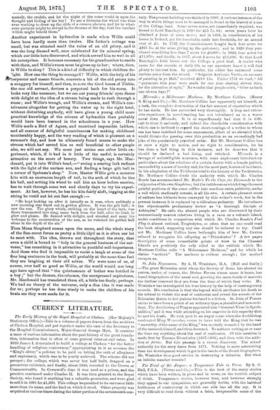CURRENT LITERATURE.
The Early History of the Royal Hospital at Chelsea. (Her Majesty's Stationery Office.)—This is a volume of papers drawn from the archives of Chelsea Hospital, and put together under the care of the Secretary to the Hospital Commissioners, Major-General George Hutt. It contains a mass of curious information about the past history of the great founda- tion, information that is often of sonic general interest and value. In 1610 James L determined to build a college at Chelsea "for the better handling of religious controversy," appropriating to it as revenue the "King's silver," a poll-tax to be paid on taking the oath of allegiance and supremacy, which was to be yearly enforced. The scheme did not prosper; the college, which was never but half built, dragged on a precarious existence, and finally, about 1648, reverted to the Crown or 'Commonwealth. In Cromwell's time it was used as a prison, and the practice continued under Charles H. It was then granted to the Royal Society, who found it anything but a valuable possession, and were glad to sell it in 1681 for £1,300. This college bequeathed to its successor little more than its name, and the land on which it stood. Other property was acquired at varionatimes during the latter portion of the seventeenth can-
tnry. The present building was finished in 1699. A curious instance of the way in which things used to be managed is found in the history of some of the College land. Some seven acres, not immediately required, was leased to Lord Ranelagh in 1690 for £15 7s. 6d; seven years later he obtained a lease of some more; and in 1698, in consideration of his losses in Ireland, got his leaseholds made into freeholds, for an annual rent of £5. In 1742, the Commissioners bought back four acres for £461 5s., at the same giving up the quit-rent ; and in 1826 they pur- chased something less than 7 acres for £9,000; in 1843, four acres for £11,970; and finally, in 1857, about 3 acres for £13,886. So that Lord Ranelagles Irish losses cos' the College a good deal. A reader who cares for the records of daily life as our ancestors knew it will find plenty to interest him. In particular, the editor has extracted some
curious notes from the record. Seignior Anthonio Verne, on account of painting in ye Hall," received £210 15s. Under 1752 we read, e All "payments this year wore made for one year abating eleven days, for the alteration of style." No wonder that people cried, Give us back our eleven days !"






























 Previous page
Previous page